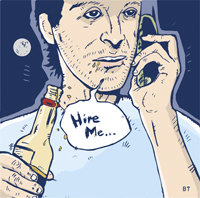by Rosanne Lurie
Though few of us have had occasions to paraphrase Shakespeare’s inspiring (and parodied) valedictory speech, we all have the opportunity to impress future employers with a well thought through valediction. I am referring to the closing lines we write in emails and letters, you know the ones like:
• Sincerely yours,
• XXOO,
• Take care,
• Have a great day,
• All the best,
According to Wikipedia, “A valediction (derivation from Latin vale dicere, ‘to say farewell’), or complimentary close in American English, is an expression used to say farewell, especially a word or phrase used to end a letter or message, or the act of saying parting words- whether brief, or extensive.” In its more day-to-day form, a valediction is not inspiring bit of dramatic oratory, but a chance for you to impart a final tone to whomever you are writing to – one of intimacy, formality, or in the case of a potential employer, one of professionalism. We career advisors spend a fair amount of time reading cover letters and emails from eager candidates who work hard to craft documents that will impress hiring managers. I want to remind you that your valediction counts. There are formal ones and informal ones, appropriate for different readers. The standard for writing to someone you don’t know (but want to work for) shouldn’t vary much from one of the following:
• Sincerely yours,
• Sincerely,
Other, less commonly used, but generally accepted professional valedictions are:
• Best regards,
• Regards,
• Cordially,
• Yours truly,
Your valediction reminds an employer that you understand the writing standards of the working world, and that you yourself are professional in your communications. Language and communication evolves, so there are no hard and fast rules but rather conventions you can learn which will help you make the impression that you would fit well in the employer’s world. Here are some recommendations:
1) Stay away from anything that sounds emotive or implies intimacy (Love – Warm regards – Take care) or something too casual (Best wishes – Cheers – Have a nice day).
2) International students in particular may make a poor impression inadvertently, when they write letters with valedictions which are appropriate at home. Mostly I have seen more honorifics in these students’ letters, which are not used in conventional business letters in the USA. This means that “With greatest honor” or “With deep respect” or “Most humbly submitted” sound formal, but in fact are not quite what is called for in professional correspondence. As a result, these letters show a lack of understanding, not the respect they intend. If you are unsure about writing cover letters or other job search correspondence, look at the samples and guidelines provided on the Career Services website, or ask an advisor.
3) Additionally, when you are emailing, do not skip the valediction. “Sent by my iPhone” does not help your cause, unless you are applying to Apple for a job (and even then, maybe not). More often than ever, people close their letters/messages with just an automated signature or their name. This may be okay in informal correspondence but not when you are writing to an employer or recruiter.
Your impact, with a valediction, is to bring thoughtful closure to your message. And, with that said, I will sign off –
GLHF (good luck, have fun),
– Rosanne














